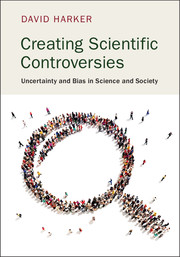Book contents
- Frontmatter
- Dedication
- Contents
- Preface
- Introduction: scientific authority and the created controversy
- Part I Lessons from the Philosophy of Science
- Part II Biases, Arguments and Created Controversies
- Part III Exposing Created Controversies
- 8 Environmental scare: the case of anthropogenic climate change
- 9 Sciences, religion and an intelligently designed controversy?
- 10 Issues of public health: AIDS, autism and GMOs
- Points to remember: Part III
- Concluding remarks
- References
- Index
10 - Issues of public health: AIDS, autism and GMOs
from Part III - Exposing Created Controversies
Published online by Cambridge University Press: 05 October 2015
- Frontmatter
- Dedication
- Contents
- Preface
- Introduction: scientific authority and the created controversy
- Part I Lessons from the Philosophy of Science
- Part II Biases, Arguments and Created Controversies
- Part III Exposing Created Controversies
- 8 Environmental scare: the case of anthropogenic climate change
- 9 Sciences, religion and an intelligently designed controversy?
- 10 Issues of public health: AIDS, autism and GMOs
- Points to remember: Part III
- Concluding remarks
- References
- Index
Summary
If there are secrets to long life and good health, then most of us would wish to know them. If there are products or treatments, supplements or procedures, that would cure our illnesses or ameliorate our symptoms and suffering, then many of us would spend liberally to avail ourselves of the benefits. If our friends, siblings, parents, spouses and, perhaps most of all, our children are confronted with chronic illnesses, severe and considerable daily challenges, acute pain or discomfort, then we will be highly motivated to pursue avenues that promise relief for those we love. Our tendencies here are natural and appropriate. They also make us vulnerable to exploitation.
There is a long history of people who have peddled elixirs and assured customers that their products will cure incurable conditions, prolong life, rejuvenate, revitalize and vivify. Of course, such miracle products come at a price, but the benefits promised are often sufficiently alluring – and potential customers often sufficiently desperate – that collectively we continue to spend billions of dollars on products that can claim, at best, highly questionable therapeutic value. In fact, not only do we part with sums of money we can ill afford, but in some cases we subject ourselves to procedures that are more likely to induce harm than benefit. The claims made by the manufacturers of these products may be nonsense, but if they are dressed in enough technical jargon, promoted by individuals with enough charisma, recommended by celebrities of sufficient stature, given credibility by media outlets that should know better and align closely enough with common wisdom, then the nonsense will often go unnoticed.
There is little doubt that we could all profit from adopting a more critical and careful attitude towards the purported virtues of various expensive cosmetics, herbal supplements, revolutionary diets or so-called complementary and alternative medicines. Nevertheless, the promotion of products through dubious or absurd claims doesn't typically escalate to the level of creating a scientific controversy. We'll retain our focus on ostensibly created controversies, so this chapter will be concerned with instances when mainstream sciences have come under more direct attack and where the promotion of alternative treatments enters the narrative only more peripherally.
In the next two sections, we'll consider cases from the medical sciences.
- Type
- Chapter
- Information
- Creating Scientific ControversiesUncertainty and Bias in Science and Society, pp. 224 - 245Publisher: Cambridge University PressPrint publication year: 2015



